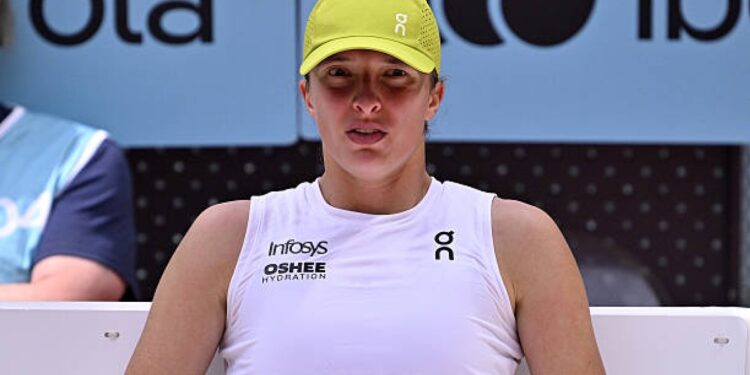During her press conference following a win at the 2025 Mutua Madrid Open, Iga Swiatek found herself in an uncomfortable and rather tense moment when a question struck a nerve. The Polish tennis star, who has long been known for her calm composure and thoughtful answers, was visibly displeased when asked to compare the men’s and women’s tennis tours — specifically whether the ATP Tour has started to resemble the WTA Tour in terms of competitiveness and unpredictability. The question, possibly unintentionally, carried a hint of criticism toward the openness of the WTA, implying that a lack of dominance by a few players might be viewed as a negative.
The reporter’s query was framed around the idea that, in recent months, the ATP Tour has seemed more “open,” with a broader pool of players making deep runs and winning major events, a trend historically more associated with the WTA. This openness — meaning no single dominant figure consistently winning titles — has sometimes been used to criticize the women’s tour, implying inconsistency or lack of top-level stability. Swiatek, one of the WTA’s current leading figures and a Grand Slam champion herself, appeared taken aback by the suggestion and questioned the premise of the statement.
Looking visibly confused and slightly irritated, Swiatek responded by asking for clarification. “I don’t know what people are referring to,” she said, clearly struggling to grasp what exactly was meant by the comparison. “I need more details. What does it mean? More open?” she asked, probing for specifics.
She then offered her perspective, challenging the accuracy of the reporter’s claim. Swiatek pointed out that Jannik Sinner and Carlos Alcaraz — two of the brightest young stars in men’s tennis — had dominated the Grand Slam scene in the previous year, suggesting that the men’s tour was not as “open” as the question implied. “Jannik and Carlos won all the Slams last year,” she said, noting the contrast to the idea of unpredictability.
The exchange took a more pointed turn when Swiatek, seemingly frustrated and perhaps feeling the question was unfair or lacking in merit, added sarcastically, “I guess I have no opinion. I’m too stupid to answer that question.” Her choice of words — particularly the self-deprecating remark — reflected a clear sense of annoyance, possibly indicating that she felt the question either lacked respect for the women’s game or attempted to frame it in an unfavorable light.
The moment quickly caught the attention of fans and media alike. While some interpreted her comment as a display of sarcasm and irritation at what she saw as a flawed or loaded question, others felt it revealed her sensitivity to how the WTA is often portrayed in media narratives. Swiatek has consistently advocated for greater respect and recognition for the women’s game, and this situation seemed to touch on a broader issue of how women’s tennis is often undervalued or scrutinized more harshly than the men’s game.
The reaction also highlighted the complex dynamics in media interactions with top athletes. Questions that imply criticism or diminish the competitiveness of a tour — especially one where Swiatek has worked hard to rise to the top — are bound to provoke strong emotions. In this case, Swiatek’s sarcastic remark was interpreted by many as a defense of the WTA’s legitimacy and depth, as well as a rejection of outdated comparisons between the two tours.
While some fans found her response amusing or justified, others viewed it as uncharacteristically sharp for a player who usually maintains a level-headed demeanor in press settings. Still, it served as a reminder that even the most composed athletes can find themselves frustrated when they feel their efforts or the stature of their sport are being undermined.
In the aftermath of the press conference, Swiatek did not elaborate further on the exchange, and the topic gradually shifted back to her performance in Madrid. Nonetheless, the incident lingered in the conversation around the tournament, sparking discussions about gender perceptions in tennis, the portrayal of the women’s game in media, and the pressures top athletes face when representing more than just themselves.
Swiatk’s tense moment may have been brief, but it echoed a much larger sentiment within the tennis world — the ongoing need to challenge outdated narratives and treat the WTA with the same respect and seriousness afforded to the ATP.









